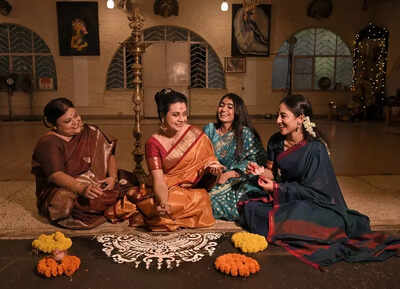ARTICLE AD BOX

Madhuboni Chatterjee and her students draw an alpona
In Bengal, festivals feel incomplete without alpona – intricate, hand-drawn patterns that transform thresholds into art. This timeless tradition can also be your daily dose of creativity, bringing motifs to life on any surface.
CT explores how to ace the practice with ease and imagination.

Anasuya Mitra of Dorjipara Mitra Bari brushes an alpona. Similar art forms are named Kolam in Tamil Nadu, and Kalamezhuthu in Kerala
Timeless practiceAlpona is rooted in tradition and symbolism. “What started as ritual drawings has slowly become an art form,” says retired teacher & alpona expert Ratnabali Ghosh. Dancer Madhuboni Chatterjee adds, “One doesn’t always have to be an expert, alpona is essentially the simple images that emerge from our imagination.”\

An alpona by Ratnaboli Ghosh
The Brahmo influenceThe Shantiniketani style of alpona took shape through Nandalal Bose, Sukumari Devi, & Surendranath Kar, later nurtured by Nandalal’s daughters.
Moving from ritualistic motifs, it absorbed global influences to reflect the ideals of the Brahmo Samaj. “Tagore began the tradition of celebrating seasons. It wasn’t limited to songs, it reflected in alpona motifs too,” says Sudhi Ranjan.

A Shantiniketani alpona by Sudhi Ranjan Mukherjee
Workshop insightsTo learn alpona basics, workshops are ideal. Artist Biplab Dhar, who will conduct an online workshop on September 6 and 7, says, “I keep motifs simple for beginners and explore non-traditional materials and spaces.” Sudhi Ranjan, who offers courses and conducts workshops, adds, “The Shantiniketani style works with an integrated plan, and that is what I try to teach first.”

A Lakshmi Puja alpona
Motifs by occasion
- Lakshmi Puja: Owl, sheaves of paddy, lotus, Lakshmi’s feet
- Saraswati Puja: Pen, inkpot, swan, veena
- Weddings: Butterflies, gachhkouto, darpan, fish and diyas
- Durga Puja: Lotus, Durga’s weapons, leaves, vines
- Seasonal celebrations: Natural patterns representing each season
- Namkaran: Kalkas, swastikas, flowers
To read more on alpona
- Banglar Broto by Abanindranath Tagore
- Banglar Alpona by Sudhansu Kumar Ray
- Rabindrabhabnay Shantiniketane Alpona by Swati Ghosh
Mix rice flour & water to make a paste, and draw an alpona. It is an aesthetic way to welcome guests
Ratnabali Ghosh, retired teacher & alpona expert
Observe nature like leaves, vines and flowers and recreate them in alpona. It is the simplest way to begin with meaning
Madhuboni Chatterjee, dancer
Always start with simple rural motifs before moving on to more complex designs
Sudhi Ranjan Mukherjee, retired professor, Visva-Bharati University
In alpona, pace is everything. Even a crooked line can transform into something new. It doesn’t always have to be traditionally symmetrical
Biplab Dhar, artist



.png)
.png)
.png)
















 1 day ago
5
1 day ago
5








 English (US) ·
English (US) ·